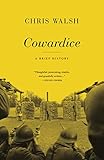Cowardice : A Brief History / Chris Walsh.
Material type: TextPublisher: Princeton, NJ : Princeton University Press, [2014]Copyright date: ©2014Edition: Pilot project. eBook available to selected US libraries onlyDescription: 1 online resource : 38 halftones. 3 line illus. 1 tableContent type:
TextPublisher: Princeton, NJ : Princeton University Press, [2014]Copyright date: ©2014Edition: Pilot project. eBook available to selected US libraries onlyDescription: 1 online resource : 38 halftones. 3 line illus. 1 tableContent type: - 9780691138633
- 9781400852031
- 152.4/6 23
- BF575.F2
- online - DeGruyter
- Issued also in print.
| Item type | Current library | Call number | URL | Status | Notes | Barcode | |
|---|---|---|---|---|---|---|---|
 eBook
eBook
|
Biblioteca "Angelicum" Pont. Univ. S.Tommaso d'Aquino Nuvola online | online - DeGruyter (Browse shelf(Opens below)) | Online access | Not for loan (Accesso limitato) | Accesso per gli utenti autorizzati / Access for authorized users | (dgr)9781400852031 |
Browsing Biblioteca "Angelicum" Pont. Univ. S.Tommaso d'Aquino shelves, Shelving location: Nuvola online Close shelf browser (Hides shelf browser)

|

|

|

|

|

|

|
||
| online - DeGruyter The Fourth Pig : Updated Edition / | online - DeGruyter Told Again : Old Tales Told Again - Updated Edition / | online - DeGruyter Zombies and Calculus / | online - DeGruyter Cowardice : A Brief History / | online - DeGruyter The History of American Higher Education : Learning and Culture from the Founding to World War II / | online - DeGruyter F.B. Eyes : How J. Edgar Hoover's Ghostreaders Framed African American Literature / | online - DeGruyter The Devil Wins : A History of Lying from the Garden of Eden to the Enlightenment / |
Frontmatter -- CONTENTS -- INTRODUCTION -- Chapter 1. Profiles in Cowardice -- Chapter 2. Of Arms and Men -- Chapter 3. The Ways of Excessive Fear -- Chapter 4. Duty-Bound -- Chapter 5. The Rise of the Therapeutic -- Chapter 6. So Long a File -- ACKNOWLEDGMENTS -- NOTES -- BIBLIOGRAPHY -- ILLUSTRATION CREDITS -- INDEX
Coward. It's a grave insult, likely to provoke anger, shame, even violence. But what exactly is cowardice? When terrorists are called cowards, does it mean the same as when the term is applied to soldiers? And what, if anything, does cowardice have to do with the rest of us? Bringing together sources from court-martial cases to literary and film classics such as Dante's Inferno, The Red Badge of Courage, and The Thin Red Line, Cowardice recounts the great harm that both cowards and the fear of seeming cowardly have done, and traces the idea of cowardice's power to its evolutionary roots. But Chris Walsh also shows that this power has faded, most dramatically on the battlefield. Misconduct that earlier might have been punished as cowardice has more recently often been treated medically, as an adverse reaction to trauma, and Walsh explores a parallel therapeutic shift that reaches beyond war, into the realms of politics, crime, philosophy, religion, and love.Yet, as Walsh indicates, the therapeutic has not altogether triumphed-contempt for cowardice endures, and he argues that such contempt can be a good thing. Courage attracts much more of our attention, but rigorously understanding cowardice may be more morally useful, for it requires us to think critically about our duties and our fears, and it helps us to act ethically when fear and duty conflict.Richly illustrated and filled with fascinating stories and insights, Cowardice is the first sustained analysis of a neglected but profound and pervasive feature of human experience.
Issued also in print.
Mode of access: Internet via World Wide Web.
In English.
Description based on online resource; title from PDF title page (publisher's Web site, viewed 23. Mai 2019)


